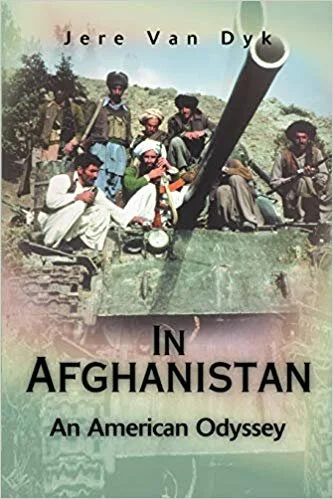In Afghanistan: An American Odyssey
Van Dyk got into Afghanistan, suffered physical hardship, saw some action and emerged to write this fascinating narrative. It is fascinating because the author gives us a clear and, on the whole, unbiased picture of the men who are fighting the Russians and the society that bred them...what he did see is reported with clarity, lucidity and those occasional human insights that bring a war, no matter how distant, home to the reader. For war buffs, there is plenty of action: the pounding of artillery and tanks on men who have nothing more serious than old British Enfield rifles. But in the end, the book's greatest value is the picture it gives of the Afghan people. Primitive they are, but like the peasants of Russia and China they have sought and found a true nobility in the crucible of war." (NYT 11/29/83)
"That indomitable resistance is seen dramatically in Jere Van Dyk's Ïn Afghanistan","a book directed at a general readership. Mr. Van Dyk, an American from Washington state, who studied at the Sorbonne and has been an aide to Sen. Henry Jackson, visited peaceful Afghanistan in 1973. In the autumn of 1981, in search of himself, and or an accomplishment,"he spent nearly three months in the combat zones of Afghanistan, to share some of the life and struggle of the mujahideen and, if possible, to stir America to aid them beyond whatever we may have done. Many of his photographs enhance his narrative."
Repeatedly, he was told that the West was "more afraid of Islam than you are of Communism." The Mujahideen (leaders), Russia is the first enemy; the West is the second."They want us to help them help themselves, but want no westernization." (Wall Street Journal 7/12/83
"After his foray into Afghanistan, Van Dyk was emotionally and physically exhausted. Plagued with sores, his feet bleeding, he eluded border patrols and found safety in Pakistan. Here he filed his stories, not sure they would appear in print.
"But shortly thereafter on a plane from Tripoli to Paris he picked up the International Herald Tribune and absentmindedly scanned it. There it was "six columns across, front page---Blood in the Night,"my story about the battle in Kandahar. I could not believe it. I read the first paragraph and put it down. Then, sitting on the plane, I knew for the first time that it was truly over. I had won.
"What had he won? A driven, adventurous, skilled young American had been willing to put his life on the line for--- what? A story, and more. He wanted to find a key to the lock of his identity. A journalist? A runner? An outsider? He did not find the key." (Los Angeles Times 8/11/83)
